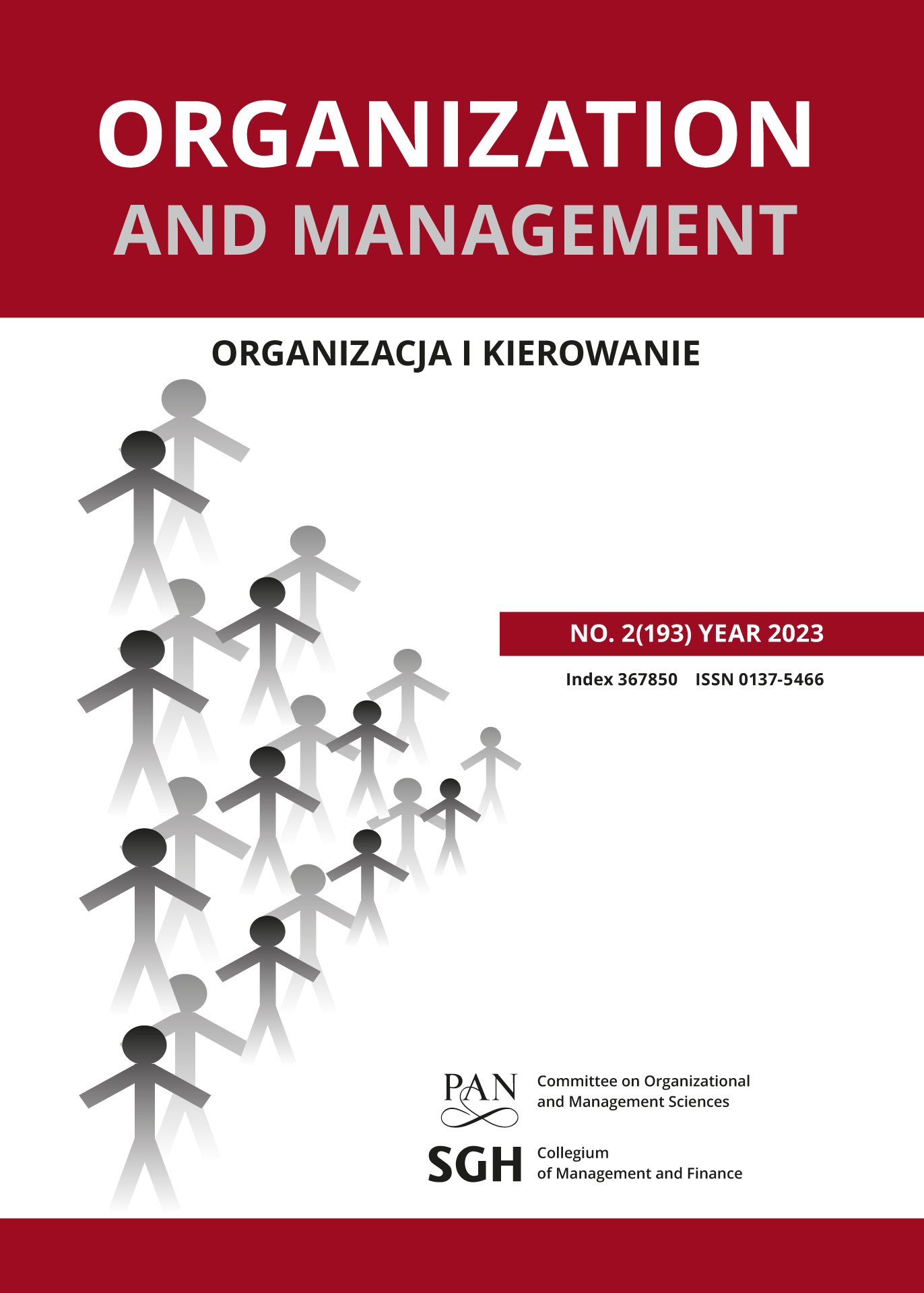Wpływ koncepcji zero waste na zachowania konsumentów w wybranej branży
Main Article Content
Abstrakt
Artykuł włącza się w nurt badań nad zrównoważonym rozwojem, ze szczególnym uwzględnieniem wpływu presji zmian klimatycznych i kurczących się zasobów na działalność przedsiębiorstw z branży odzieżowej. Przedstawia wyniki badań nad wpływem koncepcji zero
waste na wspierające gospodarkę o obiegu zamkniętym zachowania konsumentów. Dane do analiz zebrano w badaniach ankietowych i przeanalizowano za pomocą modelowania równań strukturalnych (SEM). Interpretację wyników przeprowadzono w kontekście CSR i teorii interesariuszy. Otrzymane wyniki wskazują na istotną rolę postaw i postrzeganej kontroli w kształtowaniu zachowań zero waste w zakresie konsumpcji odzieży. Subiektywne normy i świadomość konsekwencji przedstawiają się jako predyktory nieistotne.
Article Details
Bibliografia
[2]. Arvola, A., Vassallo, M., Dean, M., Lampila, P., Saba, A., Lähteenmäki, L., Shepherd, R., 2008. Predicting intentions to purchase organic food: The role of affective and moral attitudes in the Theory of Planned Behaviour. Appetite 50, 443–454. https://doi.org/10.1016/j.appet.2007.09.010
[3]. Bagozzi, R.P., Yi, Y., 1988. On the evaluation of structural equation models. J. Acad. Mark. Sci. 16, 74–94. https://doi.org/10.1007/BF02723327
[4]. Bianchi, C., Birtwistle, G., 2012. Consumer clothing disposal behaviour: a comparative study: Consumer clothing disposal behaviour. Int. J. Consum. Stud. 36, 335–341. https://doi.org/10.1111/j.1470-6431.2011.01011.x
[5]. Botetzagias, I., Dima, A.-F., Malesios, C., 2015. Extending the Theory of Planned Behavior in the context of recycling: The role of moral norms and of demographic predictors. Resour. Conserv. Recycl. 95, 58–67. https://doi.org/10.1016/j.resconrec.2014.12.004
[6]. Chen, M.-F., Tung, P.-J., 2010. The Moderating Effect of Perceived Lack of Facilities on Consumers’ Recycling Intentions. Environ. Behav. 42, 824–844. https://doi.org/10.1177/0013916509352833
[7]. Chin, W.W., 1998. The partial least squares approach to structural equation modeling. Mod. Methods Bus. Res. 295, 295–336.
[8]. Chu, P.-Y., Chiu, J.-F., 2003. Factors Influencing Household Waste Recycling Behavior: Test of an integrated Model. J. Appl. Soc. Psychol. 33, 604–626. https://doi.org/10.1111/j.1559-1816.2003.tb01915.x
[9]. Cohen, J., 1988. Statistical power analysis for the behavioral sciences, 2nd ed. ed. L. Erlbaum Associates, Hillsdale, N.J.
[10]. Duhoux, T., Le Blévennec, K., Manshoven, S., Grossi, F., Arnold, M., Mortensen, L.F., 2022. Textiles and the Environment. The role of design in Europe’s circular economy. European Topic Centre Circular Economy and Resource Use.
[11]. Esposito Vinzi, V., Chin, W.W., Henseler, J., Wang, H. (Eds.), 2010. Handbook of Partial Least Squares: Concepts, Methods and Applications. Springer Berlin Heidelberg, Berlin, Heidelberg. https://doi.org/10.1007/978-3-540-32827-8
[12]. Fawad, 2022. Understanding R Square, F Square, and Q Square using SMART-PLS [WWW Document]. URL https://researchwithfawad.com/index.php/lp-courses/basic-and-advance-data-analysis-using-smart-pls/understanding-r-square-f-square-and-q-square-using-smart-pls/ (accessed 6.26.22).
[13]. Hair, J.F. (Ed.), 2014. A primer on partial least squares structural equations modeling (PLS-SEM). SAGE, Los Angeles.
[14]. Hair, J.F., Sarstedt, M., Ringle, C.M., Mena, J.A., 2012. An assessment of the use of partial least squares structural equation modeling in marketing research. J. Acad. Mark. Sci. 40, 414–433. https://doi.org/10.1007/s11747-011-0261-6
[15]. Henseler, J., Ringle, C.M., Sarstedt, M., 2015. A new criterion for assessing discriminant validity in variance-based structural equation modeling. J. Acad. Mark. Sci. 43, 115–135. https://doi.org/10.1007/s11747-014-0403-8
[16]. Henseler, J., Ringle, C.M., Sinkovics, R.R., 2009. The use of partial least squares path modeling in international marketing, in: Sinkovics, R.R., Ghauri, P.N. (Eds.), Advances in International Marketing. Emerald Group Publishing Limited, pp. 277–319. https://doi.org/10.1108/S1474-7979(2009)0000020014
[17]. Kelly, T.C., Mason, I.G., Leiss, M.W., 2006. University community responses to on-campus resources recycling. Resour. Conserv. Recycl. 47, 42–55. https://doi.org/10.1016/j.resconrec.2005.10.002
[18]. Khan, F., Ahmed, W., Najmi, A., Younus, M., 2019. Managing plastic waste disposal by assessing consumers’ recycling behavior: the case of a densely populated developing country. Environ. Sci. Pollut. Res. 26, 33054–33066. https://doi.org/10.1007/s11356-019-06411-4
[19]. Kudłak, R., 2022. Przegląd badań dotyczących społecznych i środowiskowych efektów zaangażowania przedsiębiorstw w CSR. Przegląd Organ. 11–18. https://doi.org/10.33141/po.2022.06.02
[20]. Oom Do Valle, P., Rebelo, E., Reis, E., Menezes, J., 2005. Combining behavioural theories to predict recycling involvement. Environ. Behav. 37, 364–396. https://doi.org/10.1177/0013916504272563
[21]. Polskie Stowarzyszenie Zero Waste, 2023. URL https://zero-waste.pl/o-nas/#nasza-misja (accessed 9.28.23).
[22]. Ringle, C.M., Sarstedt, M., Mitchell, R., Gudergan, S.P., 2020. Partial least squares structural equation modeling in HRM research. Int. J. Hum. Resour. Manag. 31, 1617–1643. https://doi.org/10.1080/09585192.2017.1416655
[23]. Schwartz, S.H., 1977. Normative Influences on Altruism, in: Advances in Experimental Social Psychology. Elsevier, pp. 221–279. https://doi.org/10.1016/S0065-2601(08)60358-5
[24]. Sidique, S.F., Lupi, F., Joshi, S.V., 2010. The effects of behaviour and attitude on drop-off recycling activities. Resour. Conserv. Recycl. 54, 163–170. https://doi.org/10.1016/j.resconrec.2009.07.012
[25]. Spałek, S., Kozubek, R., 2019. Społecznie odpowiedzialne innowacje - desygnat pojęcia i definicja operacyjna. Organ. Kier. 1, 23–31.
[26]. Tonglet, M., Phillips, P.S., Read, A.D., 2004. Using the theory of planned behaviour to investigate the determinants of recycling behaviour: a case study from Brixworth, UK. Resour. Conserv. Recycl. 41, 191–214. https://doi.org/10.1016/j.resconrec.2003.11.001
[27]. Wan, C., Shen, G.Q., Yu, A., 2014. The role of perceived effectiveness of policy measures in predicting recycling behaviour in Hong Kong. Resour. Conserv. Recycl. 83, 141–151. https://doi.org/10.1016/j.resconrec.2013.12.009
[28]. Zdonek, I., Mularczyk, A., Polok, G., 2021. The Idea of Corporate Social Responsibility in the Opinion of Future Managers—Comparative Research between Poland and Georgia. Sustainability 13, 7045. https://doi.org/10.3390/su13137045
